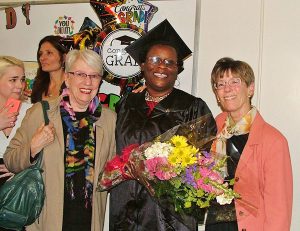
Judy Murphy, photo left.. Jennifer Kern, photo right.
Since 2007 the Branch has awarded several AAUW Scholarships each year to female non-traditional students living in the greater Bennington area. Most of the recipients are older part-time students who have previously interrupted their education to raise young children or pursue other activities.
The scholarships are funded by a theater performance each year, by public and member donations, by more than 20 “Silent Angels” who anonymously pledge to donate $100 each year, and by profits from the sale of the Scribble Sisters books. The Branch Book Group initiated a fund to buy textbooks for the scholarship recipients.
By the end of 2020, the Scholarship Committee was responsible for awarding almost $50,000 in scholarship money and 99 semesters of funding.
A little background on the scholarship committee’s work will help branch members understand all that is involved in running this our signature project and why we are so grateful to our committee for all their hard work.
To raise funds, we initially collaborated with the Bennington Chapter of the Business and Professional Women. When that group disbanded, we inherited the scholarship program as well as the food concession at the Bennington Car Show.
Jennifer Kern (see photo, right) was the Scholarship Committee Chair from the inception until 2022, and Judy Murphy (photo, left), and Gudrun Hutchins have been committee members, while Mary Feidner coordinated the Silent Angels. The four of them met initially with the Community College of Vermont (CCV) and collaborated on writing policy guidelines for the committee and for the awarding of scholarships.
In Fall 2022, Wendy Bishop took over as Scholarship Chair. The new Scholarship Board (Wendy Lyons, Chair; Norma McShane; Stephannie Peters, and Kathy Wagenknecht) met with President Suzanne Kirkpatrick on Wednesday, May 22, 2023 to finalize the process for awarding scholarships for Fall, 2024.
Because of the changes at CCV and Castleton University, our prior methodology — meeting with the counselors at CCV and identifying non-traditional women students who were performing well but needed additional funds to continue their education — is no longer possible. Instead, we have agreed upon the process described below, beginning this summer.
The Scholarship
We will award ONE scholarship for $1000.00 for the Fall Semester. The check will be written to the school, to be applied to the student’s account. (Potentially, a second scholarship for the same student could be awarded for the second semester, depending on student’s performance and strength of the scholarship fund.)
The Criteria
The applicant must be a woman of at least 25 years old who lives in Bennington County, VT. She must be enrolled in a degree program at a college for the Fall, 2024 semester. The school may be located anywhere. Applicants must demonstrate a need.
The Process
Applicants must complete the scholarship’s application and submit two letters of recommendation. Based on a 3.0 GPA, the scholarship is potentially renewable in the following year.
Applications and letters of reference will be due by July 1, 2024. All correspondence will be via email to: AAUWBENNVT@gmail.com
PR Information/Announcement
The Announcement of the availability of the Scholarship will be on the Branch’s website and also distributed to local news/social media such as Bennington Banner, Manchester Journal, VT News Guide, Front Porch Forum, Facebook Community Forums (Bennington Blotter, Manchester Community Forum, Arlington VT Matters, etc.)
